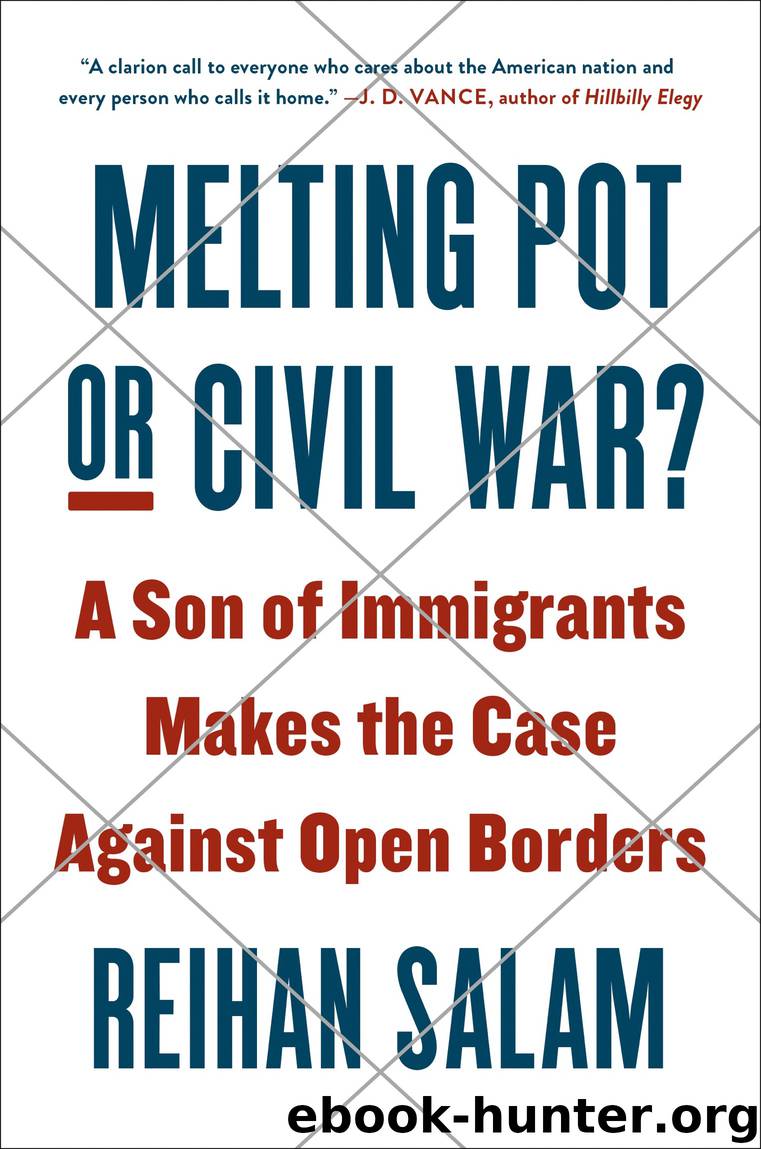Melting Pot or Civil War? by Reihan Salam

Author:Reihan Salam
Language: eng
Format: epub
Publisher: Penguin Publishing Group
Published: 2018-09-24T16:00:00+00:00
The Rocky Road to Robotopia
Aren’t there innumerable low-skill jobs that are simply not substitutable? Sluggish labor force growth in the United States means that we can’t come close to filling them without welcoming low-skill immigrants. At times, one hears a corollary argument, namely, that an alarmingly high proportion of low-skill U.S. natives are ill-suited to doing difficult and dangerous jobs that simply need to be done. We don’t have to indulge crazy fantasies about hand-drawn rickshaws or foreigners fanning wealthy Americans. Who is going to pick the fruit? And who is going to clear the bedpans?
In 2012, the immigration researchers Frank Bean, Susan Brown, James Bachmeier, Zoya Gubernskaya, and Christopher Smith identified a number of reasons low-wage employers might prefer low-skill immigrants to low-skill natives, which were ably summarized by the conservative policy analyst James Pethokoukis22 of the American Enterprise Institute: First, whereas low-skill natives are often reluctant to move from their hometowns to opportunity-rich locales, low-skill immigrants have already made that leap, and so they’re naturally more likely to be willing to move within the United States. Second, low-skill natives are more likely to struggle with alcohol and drug abuse than their foreign-born counterparts, a self-selecting population of strivers. Relatedly, low-skill natives are more likely to report being in worse health than low-skill immigrants. And finally, low-skill natives are more likely to be ex-offenders than low-skill immigrants. Bean et al. acknowledge the possibility that automation and offshoring might diminish the number of low-skill job openings in the years to come, but they expect the impact to be minimal.
There is something more than a little circular about their line of argument. Consider the supposed unfitness of low-skill natives. While it is undoubtedly true that many have been scarred by the lingering effects of childhood poverty, there is considerable evidence that many of the social maladies associated with unemployment and underemployment can be cured, or at least greatly mitigated, by a tight labor market.
Arthur Okun, one of the founding fathers of modern macroeconomics, popularized the term “high-pressure economy” to refer to a state of affairs in which unemployment is low and overall economic growth is high.23 Workers who might struggle to find remunerative employment in a low-pressure economy, where the opposite conditions prevail, thrive in a high-pressure economy, when employers have little choice but to invest in improving their production techniques and providing all of their workers with the capital they need to increase output. At the start of the 2017 tourist season, for example, restaurants and resorts in coastal Maine started hiring furloughed ex-offenders to keep up with demand.24 Eventually, employers might have no choice but to invest more in training low-skill workers, in the hopes of boosting their productivity levels. Judging by past experiences, they’ll invest in training only as a last resort. But they’ll get there.
And in time, a high-pressure economy tends to accelerate technological progress. It is only when low-wage workers start quitting their jobs to take better jobs offering higher pay that their employers will break a sweat trying to replace them.
Download
This site does not store any files on its server. We only index and link to content provided by other sites. Please contact the content providers to delete copyright contents if any and email us, we'll remove relevant links or contents immediately.
Machine Learning at Scale with H2O by Gregory Keys | David Whiting(4292)
Killers of the Flower Moon by David Grann(4037)
Oathbringer (The Stormlight Archive, Book 3) by Brandon Sanderson(3144)
Will by Will Smith(2906)
Once Upon a Broken Heart by Stephanie Garber(2843)
Guns, Germs and Steel by Diamond Jared(2365)
It Starts With Us (It Ends with Us #2) by Colleen Hoover(2338)
Borders by unknow(2301)
Friends, Lovers, and the Big Terrible Thing by Matthew Perry(2218)
The Room Where It Happened by John Bolton;(2150)
The Color of Law by Richard Rothstein(1933)
A Short History of War by Jeremy Black(1842)
The Strength In Our Scars by Bianca Sparacino(1839)
HBR's 10 Must Reads 2022 by Harvard Business Review(1837)
A Game of Thrones (The Illustrated Edition) by George R. R. Martin(1711)
Water Rights and the Environment in the United States by John Burch(1673)
515945210 by Unknown(1660)
Examples & Explanations: Administrative Law by William F. Funk & Richard H. Seamon(1639)
That Every Man Be Armed by Stephen P. Halbrook(1576)
